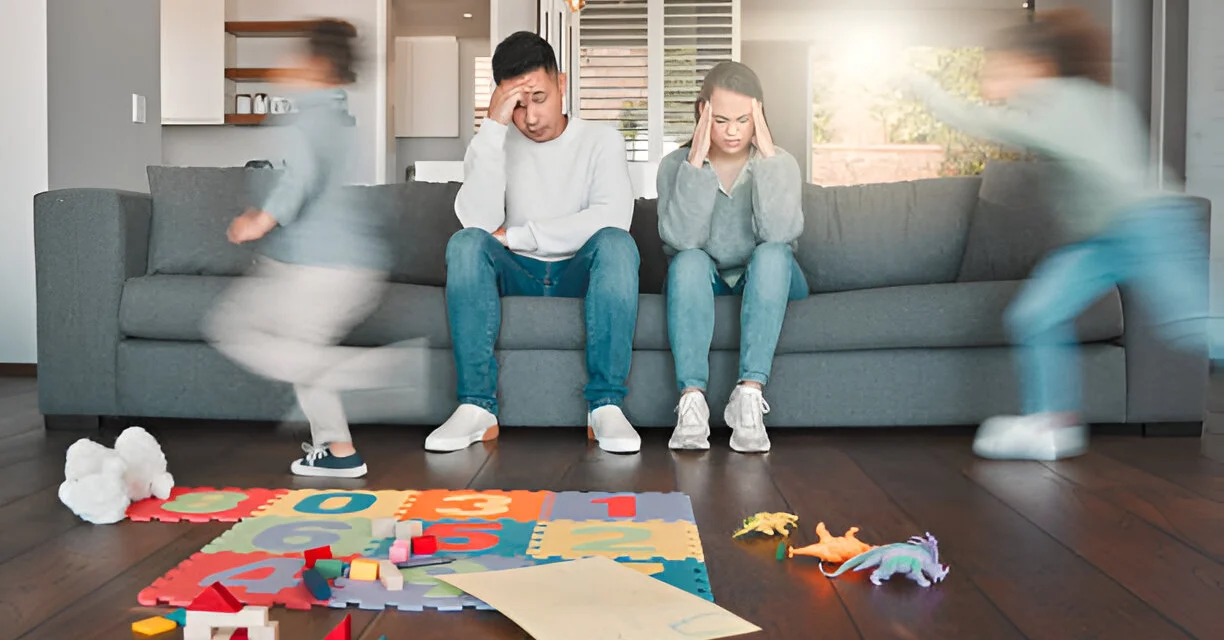Being a new parent is joyful but also overwhelming. Sleepless nights, tantrums, and endless tasks can cause stress. Parental stress is common, but you can make your home peaceful with the right strategies.
Samantha, a pediatric nurse, knows how stress affects kids. “Stressed parents can lead to short tempers and strained family bonds,” she says. “But, with a few simple changes, you can manage stress and enjoy parenting more.”
This article offers 9 powerful tips to reduce tension and increase happiness in your family. By following these strategies, you’ll soon have a more peaceful home.
Key Takeaways
- Make time for daily self-care activities like a 20-minute power walk1
- Spend time in nature to boost your mood and mindset1
- Allow children to problem-solve instead of immediately intervening
- Prioritize enjoyable hobbies and quality time with loved ones
- Maintain a positive, patient mindset when dealing with challenges
Take Time for Self-Care
Being a parent can be overwhelming, making it easy to forget about your own needs. Yet, taking care of yourself is key to handling stress and keeping your home calm. Pediatrician J. Michael Wertman, MD, says it’s vital to keep work and home life separate. He suggests deep breathing and listening to music to relax during your commute2.
Setting aside time for yourself helps you recharge. This benefits you and your family greatly.
Exercise and Rest
Exercise and rest are crucial for self-care. Pediatric nurse practitioner Crista Zufan, CNP, advises taking daily time for yourself. She recommends reading in the evening to help relax2.
Physical activity lowers stress, boosts energy, and improves your health3. Also, getting enough rest, like 20-minute naps, greatly improves your mental and physical health2.
Spend Time in Nature
Being in nature, or “eco-therapy,” is a great way to reduce stress. Whether it’s a walk in the park or a hike, nature helps balance your mind3. Nature’s sights, sounds, and smells calm and refresh you.
By adding self-care like exercise, rest, and nature time, you can manage stress better. Pediatrician Svetlana Pomeranets, MD, highlights the importance of a routine bedtime for kids. This ensures good sleep for everyone2. Taking care of yourself means you have the energy to care for your family well.
Allow Children to Problem-Solve
As a parent, you might feel the urge to solve your children’s problems for them. But, one of the best ways to manage stress is to let them figure things out on their own4. By listening more and offering fewer solutions, you help them grow in independence and critical thinking4. This not only eases your stress but also helps your kids become stronger and more resilient.
Letting your children solve problems teaches them important life skills5. Instead of fixing everything right away, give them space to think. Ask questions that help them weigh their options and think about what might happen next. This way, they learn to make decisions and become more independent.
- Resist the urge to solve problems for your children.
- Ask open-ended questions to guide their problem-solving process.
- Validate their feelings and perspectives, even if you don’t agree.
- Provide support and encouragement, but let them take the lead.
Remember, a little stress can be good for kids when they have the right support4. By letting them solve problems, you’re not just easing your stress. You’re also giving them the tools to handle life’s ups and downs4. It’s a win for everyone in the family.
Make Time for Enjoyable Activities

It’s easy to forget about our hobbies when we’re busy with parenting. But, focusing on work-life balance and lowering parental stress starts with enjoying activities. Engaging in hobbies we love can make us feel fulfilled and refreshed.
Practice Hobbies
Reading, cooking, or gardening are great hobbies to try. They offer a break from parenting and let us explore our creativity6. By making time for hobbies, we can come back to parenting with more energy and joy.
Spend Quality Time with Loved Ones
Spending time with family and friends is also key to managing stress7. It’s about sharing moments that strengthen our bonds and give us emotional support. Whether it’s a cozy night in or a fun day out, these moments are precious.
Enjoying activities we love and spending time with loved ones can help us cope with parenting stress. Work-life balance, hobbies, and quality time are vital for a peaceful and happy family life8.
Don’t Take Things Personally
As a parent, it’s natural to feel deeply connected to your child’s actions. But, it’s important not to take their actions personally. Parental stress and anxiety can grow when you react too quickly to stressful moments9. By staying calm and patient, you can manage your emotions better. This creates a more peaceful home for everyone9.
Remain Calm and Patient
When your child acts out, it’s key not to take it personally10. Using stress management techniques like deep breathing can help you stay calm11. This way, you can address the situation more effectively11. By being calm, you teach your child important self-regulation skills11.
Remember, your child’s behavior doesn’t define your parenting10. Being patient and understanding can help ease tense moments. This makes your home environment more harmonious9. With time, you’ll become more resilient in handling parenting’s daily challenges9.
| Trait | Description |
|---|---|
| Calm | Maintaining composure and responding thoughtfully, rather than reactively, to stressful situations. |
| Patient | Tolerating difficult behaviors or situations with understanding and without becoming frustrated or irritated. |
| Resilient | Bouncing back from challenges and setbacks, and adapting to the ever-changing demands of parenting. |
“Parenting is a journey, not a destination. With patience and a positive mindset, you can navigate the ups and downs with grace and resilience.”
By focusing on emotional regulation and stress management, you can make your home environment more peaceful9. It’s crucial to not take your child’s behavior personally. This helps you stay calm and respond well10.
Managing Parental Stress
Being a parent can be stressful, especially when you have to balance it with daily life. But, there are ways to manage stress and make your home a peaceful place. By using different strategies, you can keep your stress levels down and make your family happier.
Self-care is key in managing stress. Activities like exercise, enough sleep, and spending time outdoors can help. A 2021 study found that listening to music can also lower stress hormones, which is good for parents12.
Teaching kids to solve problems on their own is another great way to reduce stress. This lets parents think less about their kids’ problems and helps kids feel more independent12. Mindfulness, as shown in a 2019 study, can also help parents manage stress and improve their kids’ decision-making12.
Having a balanced life with fun activities, quality time with family, and focusing on the positive can also help reduce stress12. Enjoying moments with your kids, like exploring nature or listening to music together, can make you feel happier and reduce stress12.
| Stress Management Strategies | Benefits |
|---|---|
| Regular exercise and rest | Reduced stress hormone levels, improved physical and mental well-being |
| Mindfulness and meditation | Enhanced stress management, potential positive impact on children’s decision-making |
| Engaging in enjoyable activities | Increased positive emotions, lower parenting stress levels |
| Open family communication | Reduced tension, promotion of a sense of calm |
By taking a holistic approach to managing stress, families can create a more peaceful home. This includes taking care of yourself, improving family relationships, and staying positive. Parents can handle the challenges of parenting better and feel more fulfilled1213.
“Stress management is not just about reducing stress, but about creating a life of greater joy, meaning, and fulfillment.” – Deepak Chopra
By focusing on self-care and building a supportive family, parents can make their home a more peaceful place13. Making small changes and seeking help when needed can help parents deal with stress. This way, they can create a peaceful home that benefits everyone13.
Understand Age-Related Stressors
Parental stress changes with a child’s age and developmental stage14. Knowing these stressors helps parents plan better ways to manage stress.
Infant/Toddler Stage
The early years are tough for parents. They deal with sleep loss, tantrums, and the cost of childcare15. These challenges can cause a lot of stress.
Grade School Age
When kids start school, parents face new stressors15. There’s pressure to do well in school, manage activities, and handle social issues. It’s hard to balance work, family, and helping the child grow.
Preteen/Teen Years
The preteen and teen years are full of challenges16. Parents must deal with hormonal changes, growing independence, and peer pressure. Keeping communication open and setting limits is stressful.
By understanding these age-specific stressors, parents can find better ways to manage stress141516. Getting support and resources is also key during these times.
| Age Group | Unique Stressors |
|---|---|
| Infant/Toddler | Sleep deprivation, managing tantrums, financial strain of childcare |
| Grade School | Academic pressure, extracurricular activities, balancing work and family |
| Preteen/Teen | Hormonal changes, independence, peer influences, maintaining communication |
Recognize Physical Symptoms of Stress
Stress can really hurt your body and mind17. It can lead to heart disease, anxiety, and depression17. It’s important to know these signs to take care of yourself better.
17 Signs of stress include headaches, dizziness, and body aches17. You might also feel chest pain, shortness of breath, or get really tired17. Other signs are upset stomach, loss of sexual desire, and breathing problems17.
17 Stress can also change how you eat, make you procrastinate, or use substances17. You might feel isolated, have trouble at work or school, or not want to move much17. It can also make you miss school or work17.
17 Long-term stress can cause serious problems like depression and anxiety17. It can also lead to heart disease, high blood pressure, and strokes17. Other risks include obesity, eating disorders, and skin and hair problems17.
18 Kids are very sensitive to stress, and it can hurt their mental health18. When parents are stressed, they might not listen well or be patient18. This can affect kids at every age, from babies to teenagers.
19 Black and brown parents deal with a lot of stress from racism19. This can make them feel exhausted, anxious, and worried about failing19. They might also get headaches, have trouble sleeping, or feel sick to their stomach19.
Knowing the signs of stress helps you take action17. You can manage stress, take care of yourself, and get help if needed17. Taking care of your health is good for you and your family17.
Practice Relaxation Techniques
Being a busy parent can make it hard to find calm. But, it’s key for your health and your home’s peace. WebMD suggests two great ways: progressive muscle relaxation and deep breathing.
Progressive Muscle Relaxation
This method involves tensing and relaxing muscles all over your body20. It makes you feel the difference between tension and calm. Just a few minutes each day can bring you deep calm and refreshment20.
Deep Breathing Exercises
Deep breathing is a simple yet powerful way to reduce stress20. Dr. Andrew Weil’s 4-7-8 exercise can lower your heart rate and blood pressure21. Adding deep breathing to your day can greatly lower stress and boost your mood20.
Trying these relaxation methods can change how you handle stress and make your home more peaceful. It might take some trial and error, but the benefits are worth it22.
By adding these relaxation practices to your life, you can feel calmer, improve your health, and be a better parent212022.
| Relaxation Technique | Description | Benefits |
|---|---|---|
| Progressive Muscle Relaxation | Systematically tensing and relaxing different muscle groups to increase awareness of tension and relaxation. | Promotes a sense of calm and rejuvenation by releasing physical stress20. |
| Deep Breathing Exercises | Techniques like the Stimulating Breath and 4-7-8 exercise that help regulate the body’s physiological responses to stress. | Reduces heart rate, blood pressure, and overall stress levels2120. |
By making these relaxation techniques part of your daily life, you’re taking a big step towards managing stress and creating a peaceful home212022.
Simplify Your Life

Being a busy parent can feel like a heavy load. But, simplifying your life can help manage stress23. By clearing out clutter, organizing, and cutting back on commitments, you can make your life easier. This leads to less stress and more peace of mind23.
Begin by examining what you own and what you’re committed to24. Figure out what’s most important to your family. Look at your schedule and see where you can simplify or share tasks24. By decluttering and organizing, you can turn your home into a calm haven23.
- Make decluttering a regular part of your routine for a peaceful home24.
- Focus on what’s truly important and say “no” to things that aren’t23.
- Set up morning and evening routines to bring structure and calm23.
The aim isn’t to be perfect, but to find balance and reduce stress24. By simplifying your life, you can clear your mind and focus on what’s truly important. This leads to a happier and more peaceful home25.
| Strategies for Simplifying Your Life | Benefits |
|---|---|
| Decluttering and organizing your living spaces | Reduced feelings of overwhelm, increased sense of calm and control |
| Prioritizing commitments and saying “no” to non-essential activities | More time and energy for family, personal well-being, and relaxation |
| Establishing consistent routines and schedules | Increased structure, predictability, and stress management |
“If mama ain’t happy, ain’t nobody happy.” – Parenting Proverb24
Adopting a simplified and organized lifestyle can free your mind, lower stress, and make your home a happier place for your family232524.
Seek Support When Needed
Parenting can feel very isolating. It’s key for parents to find support when they need it. You might face stress from money issues, balancing work and family, and dealing with your child’s behavior26. The CDC says parents are feeling more stressed than before26.
Signs of stress in parents include feeling overwhelmed, getting easily irritated, and having trouble sleeping26. You might also feel physical symptoms like headaches or get tired easily. Losing interest in things you used to enjoy is another sign26. It’s vital to notice these signs and take steps to reduce stress, as it can harm your health27.
Seeking support is a great way to handle stress. You can talk to family, join a support group, or use professional help like counseling27. Many new parents, 52%, feel overwhelmed and think they’re alone in their struggles27.
By asking for help, you can manage your stress better and stay healthy27. Remember, you don’t have to face parenting challenges by yourself. Support can give you the tools and understanding you need to succeed27.
Reaching out for support can change your parenting journey for the better27. Whether it’s talking to other parents or getting help from a professional, don’t hesitate to ask for help27. Your well-being and your family’s happiness are worth it27.
Maintain a Positive Mindset
Having a positive mindset can really help with managing stress as a parent. By being grateful and staying optimistic, you can see challenges as opportunities. This approach boosts your resilience and makes parenting more enjoyable28.
Gratitude and Optimism
Being thankful can change how you see things. It helps you focus on the good stuff in your life. Taking time to enjoy the little joys and seeing the good in your life can lower stress and make you feel better29.
Being optimistic is also key in handling parental stress. Believing you can solve problems helps you tackle challenges head-on. This positive attitude builds resilience and makes parenting smoother30.
- Make a daily habit of thinking about what you’re thankful for, no matter how small.
- Change negative thoughts into positive, helpful ones.
- Be around people and things that make you feel hopeful and inspired.
By keeping a positive outlook, you can better handle parental stress. You’ll find joy in the journey and be ready for any challenges that come your way282930.
Plan and Prioritize
Effective time management and prioritization are key to reducing stress for parents. Start by making a realistic schedule that fits your duties and personal time. Focus on the most important tasks and let go of things that aren’t crucial31.
Divide big tasks into smaller steps to avoid feeling too much pressure. Use a to-do list to stay organized. But also make a “done” list to celebrate your daily wins32. Seeing your progress can boost your mood and motivation.
- Set a daily routine to give your family stability.
- Check your commitments and say “no” to things that don’t fit your priorities.
- Give tasks to your partner, older kids, or hire help to ease your burden.
- Take breaks during the day to refresh and refocus.
Good time management and prioritization help reduce stress and keep you in control as a parent. By planning and focusing on what’s important, you can make your home a more peaceful and rewarding place33.
If you’re feeling too much, don’t be afraid to ask for help from friends, family, or experts32. With the right strategies and a proactive mindset, you can handle parenting’s challenges more confidently.
Conclusion
This article shared 9 effective ways for parents to manage stress and make their homes peaceful. By focusing on self-care, teaching kids to be strong, and enjoying fun activities, parents can feel less stressed. They can also build a happier family life34.
Research shows that a program called Cognitive Behavioural Stress Management (CBSM) helps parents feel less burned out. Even after three months, its benefits last34. Also, CBSM group sessions can help parents feel less stressed than those who don’t join34.
Parents are key in helping their kids grow and stay well35. Using these stress tips can help parents feel better and improve their kids’ learning, kindness, and family life35. Sadly, many parents feel overwhelmed, with rates ranging from 0% in Cuba to 9.8% in Belgium. This number can go up to 36% for parents of kids with chronic illnesses34.
By following the 9 tips from this article, parents can find peace and balance. This creates a calm home and ensures their family’s happiness3435. Remember, taking care of yourself, teaching kids to be strong, and staying positive are all important. They lead to a healthier, more loving family life.
FAQ
What are the key strategies for managing parental stress?
How can self-care help reduce parental stress?
Why is it important to let children problem-solve on their own?
What are the benefits of making time for enjoyable activities?
How can avoiding personalizing children’s behavior help manage stress?
How do age-related stressors differ for parents?
What are some physical symptoms of parental stress?
What relaxation techniques can help manage parental stress?
How can simplifying life help reduce parental stress?
Why is it important for parents to seek support?
How can a positive mindset impact parental stress?
What are the benefits of planning and prioritization for parents?
Source Links
- Parenting Stress and Self-Care – Parents – Health
- Ready to Snap? Tips for Stressed-Out Parents
- Parenting Stress Top Tips | Self Care for Parents
- Childhood Stress: How Parents Can Help (for Parents)
- How to help children and teens manage their stress
- 4 Tips for Managing Parenting Stress
- Managing Stress as a Parent – Parenting Now
- Stress and stress management: grown-ups
- A Parent’s Guide to Parental Stress – Thrive Collective
- How to Handle Stressful Parents as an Independent Adult – Serenity Lane
- Veteran Parenting | Managing Stress
- Help Me Handle Parenting Stress
- Managing stress for a healthy family
- Parental burnout and stress
- The Current State of Parental Stress & Well-Being – Parents Under Pressure
- Managing the Stress of the Sandwich Generation: Squeezed Between Parents and Kids – Change Bridge Medical
- Stress Symptoms: Effects of Stress on the Body
- How Parental Stress Can Affect a Child’s Mental Health | SilverCloud® by Amwell®
- ‘Acknowledging Burnout Is The First Step Toward Healing’: The True Dangers Of Parental Stress | Essence
- Relaxation Techniques – StatPearls – NCBI Bookshelf
- RELAXATION TECHNIQUES FOR PARENTAL STRESS MANAGEMENT
- Relaxation Techniques for Stress Relief – HelpGuide.org
- Stressed Out? Try These Helpful Ways To Ease Parenting Stress
- Want to Be a Less Stressed Mom? Simplify Your Life – The Simplicity Habit
- Managing Parental Stress: Tips for Overwhelmed Parents – Acenda
- Parental Stress: It’s Okay Not to Be Okay
- Coping with Stress in Early Parenthood
- Strategies to cope with family stress
- How To Deal With Parental Stress | AD – Hannah and the Twiglets
- Stress Management: Techniques & Strategies to Deal with Stress
- Parenting and Stress: Effective Ways to Manage Anxiety
- Self-Care Strategies for Parents & Caregivers
- How to Cope with Parenting Stress in 10 Steps
- Cognitive behavioral stress management for parents: Prevention and reduction of parental burnout
- Mothers’ and Fathers’ Parenting Stress, Responsiveness, and Child Wellbeing Among Low-Income Families





